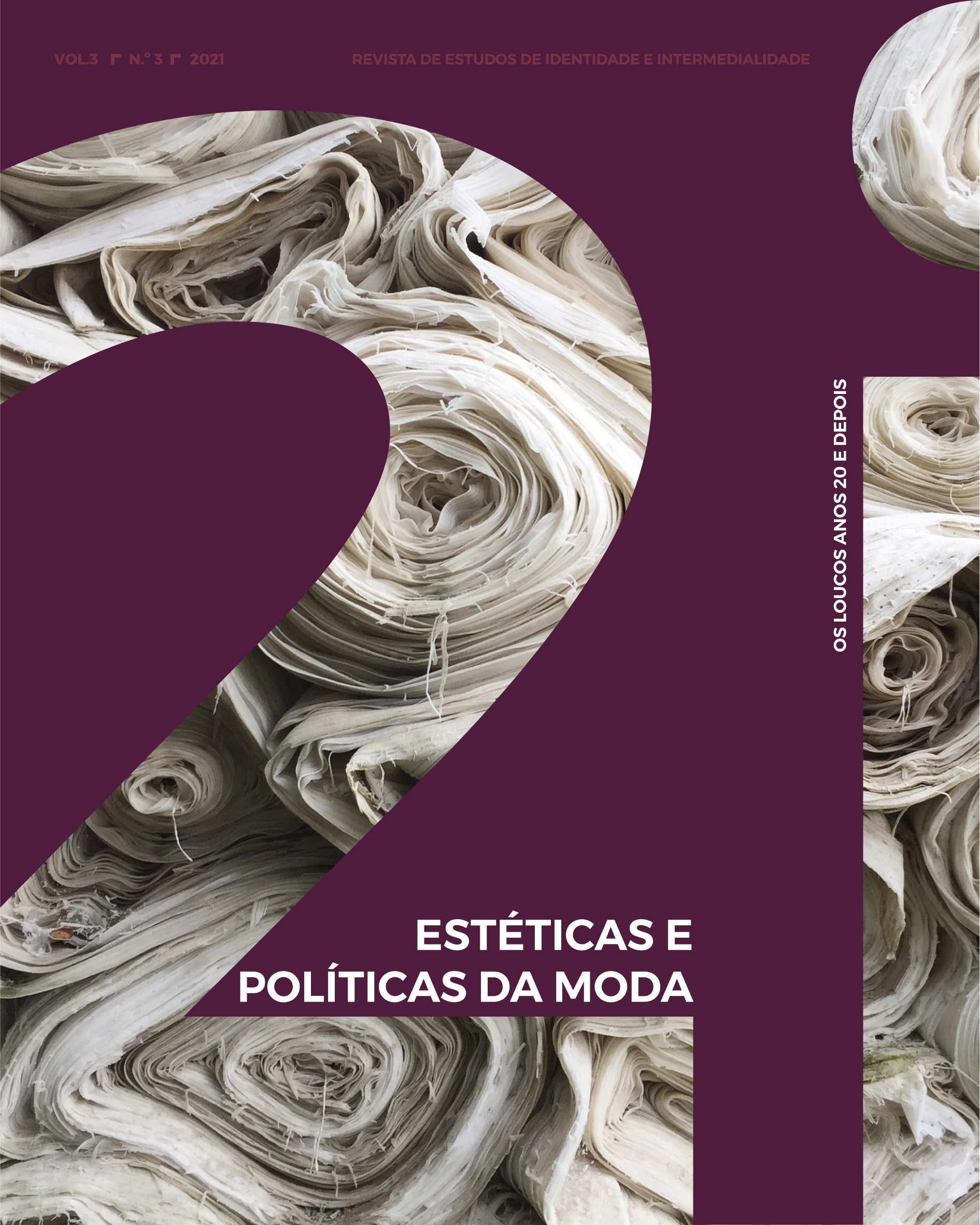Beatle Boots and Lennon Glasses - 1960s fashion in Pop Music
A translational act by The Recalls
DOI:
https://doi.org/10.21814/2i.3150Abstract
Fashion is a phenomenon strongly connected with music. Artists are aware of what they wear on stage and in public spaces and how they present themselves via social media channels. In this way, they do not only create a certain image of themselves through this self-staging strategy, but they also show their affiliation to a certain scene. In the 1960s a specific kind of music was developed which was, therefore, also characterised by a particular way of dressing and style to the current music scene which owes its strong impact to the current music scene.
The Beatles as the maybe most influential band of the 1960s with a very interesting development regarding their own fashion serve as a model for the style of the Spanish-Chilean, Germany-based band The Recalls. Their specific kind of appropriation actualises, transforms and recontextualises as a translational act the fashion of The Beatles in a postmodern way. This approach underlines the chance of establishing a transcultural dialogue and tries to develop a new perspective on other border-crossing phenomena.
Downloads
References
Aizawa, K. (2010). Fremdsprachigkeit und Fremdkulturalität – Wider die kulturwissenschaftliche Metaphorisierung der Übersetzung. In: Yamamoto, H. & C. Ivanovic, eds: Übersetzung – Transformation. Umformungsprozesse in/von Texten, Medien, Kulturen (pp. 58–59). Würzburg: Königshausen & Neumann.
Allen, G. (2011). Intertextuality, 2. ed. London/New York: Routledge.
Bachmann-Medick, D. (2014). Cultural turns. Neuorientierungen in den Kulturwissenschaften, 5. ed. Reinbek: Rowohlt.
Bassnett, S. (1990). The translation turn in cultural studies. In: Bassnett, S. & A. Lefevere, eds.: Translation, history, and culture (pp. 123–140). London: Pinter Publishers.
Bennett, A. (2000): ’Sitting in an English garden’: Comparing representations of ‘Britishness’ in the songs of the Beatles and 1990s Britpop groups”. In: Inglis, I., ed: The Beatles, popular music and society (pp. 189–206). London: Macmillan Press.
Bhabha, H. K. (2010 [1994]). The location of culture. London/New York: Routledge.
Cohen, S. (2002). Folks devils and moral panics, 3. ed. Abingdon: Routledge.
Diederichsen, D. (1999). Pop – deskriptiv, normativ, emphatisch. In: Hartges, M. et al., eds.: Pop, Technik, Poesie. Die nächste Generation (pp. 36–44). Reinbek: Rowohlt.
__________ (2014). Über Pop-Musik. Köln: Kiepenheuer & Witsch.
Doorslaer, L. van (2017). A concept’s coming of age. Developments in the use of the concept of culture in Translation Studies. In: Heller, L., ed.: Kultur und Übersetzung. Studien zu einem begrifflichen Verständnis (pp. 37–50). Bielefeld: transcript.
Eagleton, T. (1987). Awakening from modernity. Times Literary Supplement 20.2.
Eco, U. (1985). Reflections on “The Name of the Rose” (trad. William Weaver). London: Secker & Warburg.
Engelskircher, K. (2021). Intercultural dialogue via music – The Beatles’ legacy as a translational act by the example of The Recalls. Culture and Dialogue, 9/1, issue: Music, Culture and Dialogue, coming up.
Ernst, T. (2001). Popliteratur. Hamburg: Rotbuch.
Frith, S. (1996). Performing rites. Oxford: Oxford University Press.
__________ (1987). Towards an aesthetic of popular music. In: Leppert, R. & S. McLary, eds.: Music and society: The politics of composition, performance and reception (pp. 133–149). Cambridge University Press.
Greene, R. et al. (eds.) (2012). The Princeton encyclopedia of poetry and poetics, 4. ed. Princeton: Princeton University Press.
Gregory, G. (2019). Boy Bands and the performance of masculinity. New York/London: Routledge.
Gómez Peña, G. (1996). Friendly cannibals. San Francisco: Artspace Books.
Harvey, D. (1990). The condition of postmodernity. Malden: Blackwell.
Hebdige, D. (1979). Subculture: The meaning of style. London: Routledge.
Heller, L. (2017). Eulen nach Athen. Provokation und Reflexionsanstöße des translational turn der Kulturwissenschaft für die Translationstheorie. In: Heller, L., ed.: Kultur und Übersetzung. Studien zu einem begrifflichen Verständnis (pp. 93–115). Bielefeld: transcript.
Hoesterey, I. (2001). Pastiche: Cultural memory in art, film, literature. Bloomington: Indiana University Press.
Hutcheon, L. [1989] (2002). The politics of postmodernism, 2. ed. London/New York: Routledge.
Hutcheon, L. (1991). The politics of postmodern parody. In: Plett, H.F., ed.: Intertextuality (pp. 225–236). Berlin/New York: de Gruyter.
Jakobson, R. (1981). Linguistische Aspekte der Übersetzung. In: Wilss, W., ed.: Übersetzungswissenschaft (pp. 189–198). Darmstadt: Wissenschaftliche Buchgesellschaft.
Jameson, F. (1998). Postmodernism and consumer society. In: Foster, H., ed.: The anti-aesthetic. Essays on postmodern culture (pp. 127–144). New York: The New Press.
Kapurch, K. (2020). The Beatles, fashion, and cultural iconography. In: Womack K., ed.: The Beatles in context (pp. 247–258). Cambridge: Cambrigde University Press.
King, M. (2016). Men, masculinity and the Beatles. London/New York: Routledge.
Lefevere, A. (2009). Interpretation, Übersetzung, Neuschreibung. Ein alternatives Paradigma. In: Hagemann, S., ed.: Deskriptive Übersetzungsforschung. Eine Auswahl (pp. 63–91). Berlin: SAXA.
__________ (1985). Why waste our time on rewrites? The trouble with interpretation and the role of rewriting in an alternative paradigm. In: Hermans, T., ed.: The manipulation of literature. Studies in literary translation (pp. 215–243). London/Sydney: Croom Helm.
Lyotard, J.-F. (1979). La condition postmoderne. Rapport sur le savoir. Paris: Minuit.
__________ (1992). The Postmodern explained to children. Correspondence 1982–1985. Minneapolis: University of Minnesota Press.
Maitland, S. (2017). What is cultural translation? London/New York: Bloomsbury Academic.
Marshall, P.D. (2000). The celebrity legacy of the Beatles. In: Inglis, I., ed.: The Beatles, popular music and society: A thousand voices (pp. 163–175). New York: St. Martin’s Press.
McRobbie, A. (1994). Postmodernism and popular culture. London/New York: Routledge.
Miller, J. (2011). Fashion and Music. Oxford/New York: Berg.
Moore, A.F. (2001). Rock: The primary text. Aldershot: Ashgate.
Neaverson, B. (2000). Tell me what you see: the influences and impact of the Beatles’ movies. In: Inglis, I., ed: The Beatles, popular music and society (pp. 150–162). London: Macmillan Press 2000.
Norman, P. (2008). John Lennon. The Life. Harper Collins E-Books.
__________ (2016). Paul McCartney. The Biography. London: Weidenfeld & Nicolson.
Pym, A. (2010). Exploring translation theories. London/New York: Routledge. 2010
Roessner, J. (2006). We all want to change the world. Postmodern politics and the Beatles’ White Album. In: Womack, K. & T.F. Davis, eds.: Reading the Beatles. Cultural Studies, Literary Criticism, and the Fab Four (pp. 147–158). Albany: State University of New York Press.
Savage, J. (2017, 8th June). You say you want a sexual revolution: Why 1967 is the year pop came out. The Guardian. Consulted in https://www.theguardian.com/music/2017/jun/08/1967-the-year-that-pop-came-out-beatles-rolling-stones-kinks (9.10.2020).
Sennett, R. (2003). Resistance. In: Bull, M. & L. Back, eds.: The auditory culture reader. Oxford: Berg.
Sims, J. (1999). Rock/Fashion. London: Omnibus Press.
Spicer, M. (2009). Strategic intertextuality in three of John Lennon’s late Beatles songs. Gamut, 2/1, pp. 347–376.
Stokes, Martin (1994). Introduction: Ethnicity, identity and music. In: Stokes, M., ed: Ethnicity, identity and music: the musical construction of place (pp. 1–27). Oxford: Berg 1994.
Sturge, K. (2011). Cultural translation. In: Baker, M. & G. Saldanha, eds.: Routledge encyclopedia of translation studies, 2. ed. (pp. 67–69). London/New York: Routledge.
The Beatles (2000). The Beatles Anthology. San Francisco: Chronicle Books.
Tonelli, C.J. (2011). Musical pastiche, embodiment, and intersubjectivity: Listening in the second degree. San Diego: University of California.
Toro, A. de (1996). Die Postmoderne und Lateinamerika (mit einem Modell für den lateinamerikanischen Roman). In: E. Höfner & Schoell. K., eds.: Erzählte Welt. Studien zur Narrativik in Frankreich, Spanien und Lateinamerika (Theorie und Kritik der Kultur und Literatur, Bd. 8) (pp. 259–299). Frankfurt am Main: Vervuert.
__________ (2006). Hacia una teoría de la cultura de la ‘hibridez’ como sistema científico ‘transrelacional’, ‘transversal’ y ‘transmedial’. In: Toro, A. de, ed.: Cartografías y estrategias de la ‘postmodernidad’ y la ‘postcolonialidad’ en Latinoamérica. ‘Hibridez’ y ‘Globalización’ (pp. 195–242). Frankfurt: Iberoamericana/Vervuert, TKKL/TCCL, Vol. 32.
__________ (2014). Los fundamentos del pensamiento occidental del siglo XX: La ‘postmodernidad’ y la ‘postcolonialidad’. In: Gadea, C.A. & E. Portanova Barros, eds.: A “questão pós” nas Ciências Sociais. Crítica, estética, política e cultura (pp. 97–166). Curitiba: Appris.
Wagner, B. (2009). Kulturelle Ü. Erkundungen über ein wanderndes Konzept, Kakanien, Revisited, 1–8. http://www.kakanien.ac.at/beitr/postcol/BWagner2.pdf (10.10.2019).
Whiteley, S. (2006). “Love, love, love”. Representations of gender and sexuality in selected songs by the Beatles. In: Womack, K. & T.F. Davis, eds.: Reading the Beatles. Cultural Studies, Literary Criticism, and the Fab Four (pp. 55–69). Albany: State University of New York Press 2006.
Wolf, M. (2010). ‘Kulturelle Übersetzung‘ – Spielwiese für übersetzerische Beliebigkeiten oder Spielarten von Übersetzung ‘nach Babel’? In: Yamamoto, H. & C. Ivanovic, eds.: Übersetzung – Transformation. Umformungsprozesse in/von Texten, Medien, Kulturen (pp. 44–55). Würzburg: Königshausen & Neumann.
Quoted interviews with The Recalls:
Interview by Kathrin Engelskircher with Jonathan Neira, Stuttgart/Mannheim (19.2.2020) and Momo Lebrón, Cologne/Mannheim (13.3./16.3.2020).
Interview by Kathrin Engelskircher with The Recalls, Hamburg (26.6.2020).
Downloads
Published
How to Cite
Issue
Section
License
Copyright (c) 2021 Kathrin Engelskircher

This work is licensed under a Creative Commons Attribution-NonCommercial 4.0 International License.


.jpg)










